Antioch City Council passes Rent Stabilization Ordinance on split vote
Wednesday, August 24th, 2022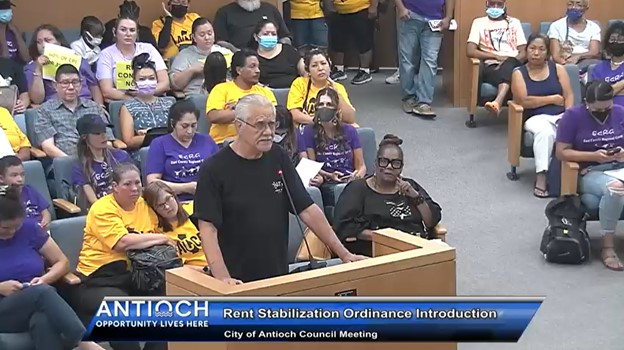
Former Antioch Councilman Ralph Hernandez speaks in favor of the Rent Stabilization Ordinance before a packed council chambers on Tuesday, August 23, 2022. Video screenshot
Following tenant organizing across city by out-of-town organizations over rent hikes, evictions and alleged harassment
65 people including residents who claim to have received threats speak in support to prevent further homelessness from surging in the area
Only affects those in multi-family housing
By Allen D. Payton
In response to the inflation due to the overspending by Congress during the past two years and the shutdown of the economy leaving many residents unable to pay their rent, and following several actions this year by tenants living in Antioch apartments, the City Council voted 3-2 for a Rent Stabilization Ordinance on Tuesday, August 23. Mayor Pro Tem Mike Barbanica, who had argued for an alternative that wouldn’t hurt “mom and pop” landlords, and District 3 Councilwoman Lori Ogorchock who offered different percentages, opposed the ordinance. Rent Stabilization Ordinance ACC082322
During the public hearing that was moved to the beginning of the meeting for the standing room only audience, a total of 65 people including renting families from across the city, spoke at the meeting to strongly urge city council members to:
- cap rent increases at 60% of CPI or 3%, whichever is less
- ensure affordable housing and specifically, Low-Income Housing Tax Credit (LIHTC) buildings are covered
- implement the measure retroactively to January 2022
- include a rent board and tenant appeal process, and to
- immediately freeze rent to avoid retaliation by landlords
This council meeting follows the January 25, 2022, meeting where the Antioch City Council voted to direct City staff to begin drafting Rent Stabilization, Tenant Anti-Harassment and Just-Cause for Eviction Ordinances – all three which they promised would be brought to a vote in a future meeting.
According to tenantlawcalifornia.com, “on October 8, 2019 a new statewide rent control law, AB1482 also known as the ‘Tenant Protection Act of 2019’ was passed that, among other things, limits the ability of landlords to raise rents and includes limitations on the ability of landlords to terminate leases commonly known as “just cause for evictions”.
The law requires a landlord have a “just cause” in order to terminate a tenancy and limits annual rent increases to no more than 5% plus the local Consumer Price Index (CPI) or 10%, whichever is lower.
However, a loophole in the law allows a higher rent increase if the tenant is given a longer notice period than 60 days.
Organizers claim renters in apartments owned by Santa Monica-based Levy Affiliated LLC received rent increases between $200 and $700 per month threatening to displace them. An email was sent to Levy Affiliated Tuesday night, asking if that is true and isn’t it in violation of state law AB1482 which caps annual rent increases to 5% plus CPI or 10% whichever is less. They were also asked, if not, how much have rents increased in the units your company rents in Antioch.” No response was received as of Wednesday morning at 11:00 a.m. Please check back later for any responses from the company.
Only a few people, including a former rental property in Antioch, spoke against the matter.
“I am against the ordinance,” he said wanting flexibility to allow for some increases in rent to cover the costs of repairs.
The primary complaints were against the Delta Pines, Casa Blanca and Delta View apartment complexes. In addition, a rally and “Walk of Shame” march was held at the Twin Creeks Apartments on James Donlon Blvd. earlier this year. (See related article)
One speaker said there were 800 evictions in East County and only 33 in Central County this year, during the same time period.
Another lady said, “it’s a Black and Brown thing”, claiming people are making comments on Craigslist that the increase in rents is part of a plan to get Black and Hispanic families to move out of Antioch.
“This is the system that Oakland uses and soon, Richmond will use,” said an attorney for ACCE. It’s also what San Francisco and Berkeley use, he shared.
“Antioch is behind the times in tenant protections,” the attorney continued. “We know what’s legal and what’s not legal.”
Some of the speakers also asked for Tenant Anti-Harassment and Just-Cause for Eviction Ordinances but they were not on the agenda for discussion or a vote.
Joe Stokely also spoke against the proposed ordinance saying, “I believe their plight. But I think it’s limited to a few landlords. The majority of landlords are good people. I know there are laws in place. I don’t believe it’s in the best interest of people to pass new laws. There have been laws in place for decades. I don’t hear anything about the existing laws. My concern is that you’re going to cause a bigger problem for Antioch…you’re going to cause an unfair environment for people not to be in business.”
“What I hear over and over again is a few bad actors,” he continued. “The effort should be put into remedying that. Having an extra layer of bureaucracy and laws is not the answer.”
Another speaker in favor of the ordinance warned of making it too strict, as it could affect the non-profit housing providers in Antioch. “It could be a bad, unintended consequence.” She spoke of working with the council and city attorney, “to get it right the first time.”
“If you put rent control, here the renter’s will be happy,” said another speaker against the ordinance. “A lot more housing is the only way to decrease the price for a lot of people to live. Antioch has a lot of housing. With a 60% CPI who in their right mind will build in Antioch? Rent control is not an answer. We should just let the free market work and let people build more homes in Antioch.”
Joe Summers of the Contra Costa Central Labor Council responded to the comment that “the city simply needs to build more housing. I agree all cities should build more affordable housing. But Antioch can’t just build its way out of the problem. The city must act to protect the residents…to prevent a mass exodus from Antioch…pushing more people out of the area or out on the street.”
California Apartment Association representative said, “Antioch already has rent control…with AB1482. Governor Newsom said, ‘California already has the strongest renter protections…’”
“The concept of cost sharing is not something supported by property owners,” she continued and wanted the tenants to pay for any additional costs the city would pass through to the properties.
“Please look into the exemption…for the fair rate of return,” she stated. “Remember, most rental property owners are small, family owners.” She said the ordinance could force property owners
“No one should live in uninhabitable homes. CAA supports strong code enforcement. The city could engage in a robust education campaign”…and “a due process without assuming that one side is guilty…without harming one specific group. Don’t make providing housing more difficult…because according to the proponents, nothing is ever enough.”
A landlord with properties in Antioch named Mack, spoke last saying, “it’s heartbreaking to hear from some tenants. But it’s a targeted issue.”
“I would like to emphasize the supply and demand which is a basic economic principle. The supply and demand in Antioch is reasonably balanced. I’m afraid rent control in Antioch may break that balance…many mom and pop landlords…will be scared and walk away from their rental business. Several years later you will see a drop in rental properties.”
There are 45,000 units in San Francisco empty. You know why? Because such strong rental ordinance for years. Many of the mom and pop owners walked away from the rental business. It doesn’t mean they sold the house. They just left the property empty. I want the council members to pay attention to this very real issue.”
He then mentioned the high population of homeless in San Francisco.
“San Francisco has the highest rent in the nation,” Mack then said. “Do you know why? Because the rent control ordinance is so strict.”
“The fundamental solution is to build more housing, to provide more to have a balanced society to protect the tenants, the more vulnerable…” He was cut off because he had reached his five-minute time limit to speak.
Council Discussion & Split Vote
Following public comments, the council members took up the matter after a break, Mayor Lamar Thorpe shockingly said jokingly that he wanted to entertain a motion to postpone the item until next year. “I just want to get the blood pumping,” he stated while laughing.
District 1 Councilwoman Tamisha Torres-Walker spoke first.
“I noticed all the opposition was online, today. They couldn’t be inconvenienced to show up, tonight,” she said. However, the first speaker against the ordinance spoke at the podium inside the council chambers.
About the vacant rentals in San Francisco she said, “I would say those units are empty because the filthy rich don’t want them, and the working poor can’t afford them.”
Torres-Walker wanted to take action now, “rather than do a slow crawl on the floor.”
“I’m just thankful that you’re all here, tonight,” District 3 Councilwoman Lori Ogorchock said speaking next briefly. “I’m going to go ahead because it’s getting late and let others speak on this.”
District 4 Councilwoman Monica Wilson asked a question of a speaker named Leah about what housing services means.
“Housing services refer to…parking, having a refrigerator, do you have a microwave, access to pools,” she said. “If you don’t include those they can be taken away.”
“Because it was in the letter we received, yesterday and…“I want everything included, the retroactive back to January,” Wilson stated.
Mayor Pro Tem Mike Barbanica said, “raising somebody’s rent 30, 40, 50% is outrageous.” He said he asked for proof and was provided it.
“What we are looking at is corporate landlords,” he stated. “I know what you are going through. I personally reached out to that management, and they are in Texas. I’ve yet to get a call back. It’s ludicrous.”
“I don’t disagree with what anyone is saying here, at all,” Barbanica stated. “My concern is we will hurt the mom and pops. I want to meet in the middle to protect the mom and pops.”
“This ordinance is only for non-exempt properties,” he then asked the city attorney who directed him to the list of exemptions in the ordinance.
“The majority of properties in Antioch they are not going to apply…due to existing law,” Barbanica stated, mentioning “Costa Hawkins”.
According to costa-hawkins.com, “the Costa-Hawkins Rental Housing Act is a California state law” passed in 1995 “that exempts certain kinds of residential rental units from rent control ordinances and allows landlords to reset the rental rate on rent-controlled rental units where they become vacant or where the last rent-controlled tenant no longer permanently resides at the unit (including where they move and leave behind subtenants).”
“They’re exempt if they’re newer than 1994 or if there is only one unit on the property like a single-family home or a duplex in which the owner is living in one of the units,” Barbanica later explained.
It was considered a “moderate approach to overturn extreme vacancy control ordinances [that] unduly and unfairly interfere with the free market”
In response to Thorpe asking for input from the council members, Wilson then offered the 3% cap and 60% of CPI that was requested by many speakers.
“I was looking at the 5 to 10%,” Ogorchock said to groans from the audience. “We have to start some place and I was looking at the Costa Hawkins and we have to look at some of those. I apologize if that doesn’t make some people happy. I don’t want to see these homes go up for sale. The owners can turn them into condos.”
Torres-Walker also supported the 3% cap and 60% of CPI saying, “this is where the ordinance needs to start from.”
“I’ve heard the same argument. Landlords are going to sell their properties,” Torres-Walker said. “It’s a business. I’ve yet to see a landlord take their property off the market because it’s bad for business not to make money.”
Barbanica then said, “I support us doing something. But I don’t support hurting…the moms and pops. I support closing the loopholes for 1482. That will stop the 30%, 40% increases…and we can do that locally.”
“What is a ‘mom and pop’ landlord?” Torres-Walker said.
“They’re not corporate. These are everyday folks who have saved up their money and buy one unit,” Barbanica, a real estate broker and property management company owner responded. “What we’re talking about is corporate landlords.”
“Thank you for that clarification,” the councilwoman responded. “I don’t think anyone who has talked, today are talking about mom and pops and they are trying to follow the rules…and I don’t think they will
“Following 1482 would not allow them to do that, not reducing it lower than that,” Barbanica responded. “Those folks experience inflation, too.”
“I know a lot of mom and pop renters and they remind me that they don’t raise the rents beyond a certain amount,” Thorpe stated. “So, I don’t know how this will affect mom and pops.”
“The mom and pop landlord, as their costs go up…they are increasing their rent accordingly,” Barbanica explained. “If they do they raise it less. But this allows them to stay within state law.”
“I used to work for First 5,” Thorpe stated, speaking of how they’ve been working on an ordinance in Concord for seven years.
“This is the first part of our tenant protection ordinances, rent control, which I’ve proposed,” he said then mentioned the Tenant Anti-Harassment and Just-Cause for Eviction Ordinances.
He then asked for a motion. Barbanica then moved that the limit on rental rate increases with AB1482 and follows the guidelines and closes the loopholes.” It died without a second.
Wilson then moved approval for an ordinance that, “sets a limit on rental rate increases at sixty percent (60%) of the Consumer Price Index for All Urban Consumers in the San Francisco-Oakland-Hayward Area published by the Bureau of Labor Statistics with a three percent (3%) cap. Torres-Walker seconded the motion and it passed on a vote of 3-2 with Barbanica and Ogorchock voting no.
Wilson then introduced the ordinance by title only and waived the first reading of the ordinance.
“We can have a discussion now on Attachment A, correct?” Ogorchock asked.
“We’re introducing the ordinance. This is it,” Thorpe explained.
“There’s a section on the landlords being charged a rate. They’re being charged Measure O, a rental tax ordinance and a business license tax. Can we waive that? Do we have to have that?”
“That’s how we fund the program,” City Attorney Thomas Smith said.
“Isn’t that the cost of doing business?” Torres-Walker asked.
“It is the cost of doing business,” Thorpe responded. “For the mom and pop it could be making it a little difficult. I am sympathetic about that and it’s something we can look at, at a later time.”
“I’m saying it’s something we can look at and take out,” Ogorchock said. “They’re paying different fees. I can’t find it, right now. We can come back to it, later.”
“These fees are not going to start, tomorrow,” Thorpe stated. But the taxes on rental properties are already in place and being collected by the city.
The motion also passed on a 3-2 vote with Barbanica and Ogorchock voting no, again.
“OK. Now, it’s official,” said Thorpe to cheers from the audience and shouts of “si, se puede” meaning “yes, we can.”
However, the request to make the ordinance retroactive to January 1, 2022. Antioch will be the only city in the state that implemented rent stabilization to not have a retroactive clause which means landlords can raise rents before the second reading of the ordinance at the next council meeting.
Coalition of Out-of-Town Organizations in Favor of Ordinance Offer More Examples of Antioch Tenant Challenges
According to a press release by a coalition of the East County Regional Group (ECRG), First 5 Contra Costa, The Alliance of Californians for Community Empowerment (ACCE) Action, and Concord-based Monument Impact:
“ECRG member Dulce Franco, is a single mother who has lived with her two children and elderly mother at Casa Blanca for 11 years. Dulce recently received a 33% rent increase of $381. While the notice was rescinded for insufficient noticing, she is afraid of receiving another similar increase in the future. Dulce recently lost her job and does not have a way to move. She barely stays afloat with the current rent. Dulce and her neighbors are like a family. She is afraid to be separated from her support network. Dulce is also concerned with significant habitability violations including mold, bugs, unrepaired floors and broken bathtub. Without rent control, Dulce and her family are at risk of another extreme rent increase and would have to move out of the area, separating her kids from their friends and their community at Casa Blanca.
ECRG member Rocheall Pierre is an Antioch resident and single mother who pays $1,800 for one bedroom apartment in a corporate owned building. Rocheall works two jobs to pay the rent and often has to make tough choices between paying the rent, putting gas in her car or buying food and clothes for her son. Rocheall has been displaced before and knows what it is to be homeless. She lives in constant fear of being evicted and displaced again as a result of unaffordable rents. Rocheall believes that citywide rent control will help her and other families like her be more secure in Antioch.
ACCE-Contra Costa member Della Currie is one of the many tenants impacted by negligence and high rent increases in Delta Pines. Three months ago, Della, her fiancé and three children were victims of a fire in their apartment building which destroyed many of her belongings in their two-bedroom apartment. As a result, management down-sized Della’s five-person family to a one-bedroom apartment and is now giving her a $300 rent increase to pay for her smaller unit. Della claims her current apartment is in terrible condition with mold, and that the outside of the apartment building has open asbestos which children can access.
The East County Regional Group’s recent housing assessment “Antioch CHANGE: A Community Housing Assessment of Needs, Gaps and Equity in Antioch, California” on rising rents, evictions, and harassment concerns in Antioch, collected the housing needs and concerns of over 1,000 Antioch renters between April 2021 and June 2021. The assessment found that on average respondents paid 63 percent of their monthly income on rent, leaving little for food, medicine, childcare, and other basic necessities. The report shows that the biggest concern of Antioch renters is housing affordability. Low-income residents of color and families with young children are most housing insecure, reporting higher rent burden, fears of displacement, and habitability concerns. Among renters with young children, 83 percent worried about rent increases and 75 percent worried about being able to pay the rent at all. The report also highlights that Antioch residents support local housing policies such as rent control and just cause for evictions with at least 86% of respondents in support of both.
The city of Antioch has been the ground for the largest number of evictions within the Bay Area; a March 2021 KQED investigative report found Antioch’s eviction rate to be 207.2 per 100,000 renter households, nearly double that of Richmond and approximately 50 times the rate of Oakland. Moreover, 60 percent of Antioch renters, who make up 40% of all Antioch residents, report paying more than 30 percent of their income on rent in 2021. According to a recent homelessness numbers assessment Contra Costa saw the biggest rise in homelessness in the past four years where homelessness numbers jumped by 35 percent between 2019 and 2022.”
East County Regional Group is a volunteer, parent advocacy group working to make East Contra Costa healthier, safer, and more equitable for young children and families. The ECRG is sponsored by First 5 Contra Costa’s Community Engagement and Advocacy Program.
First 5 Contra Costa helps young children start school healthy, nurtured and ready to learn by investing in services and activities focused on children during their first five years—the most important time in children’s development.
The Alliance of Californians for Community Empowerment (ACCE) Action is a grassroots, member-led, statewide community organization working with more than 16,000 members across California. ACCE is dedicated to raising the voices of everyday Californians, neighborhood by neighborhood, to fight for the policies and programs we need to improve our communities and create a brighter future.
Monument Impact is a community-based nonprofit dedicated to building skills, resources and power within immigrant, refugee and low-income communities in Concord. Located in the Monument Corridor in Concord, one of the most densely populated communities in the Bay Area, and serving immigrants in Concord and East Contra Costa, community members are engaged in identifying solutions to the challenges and barriers they face to achieving economic prosperity. Its integrated programs focus on building workforce skills; promoting mental and physical health; and ensuring the community’s voice is heard on critical local issues impacting local immigrant families.











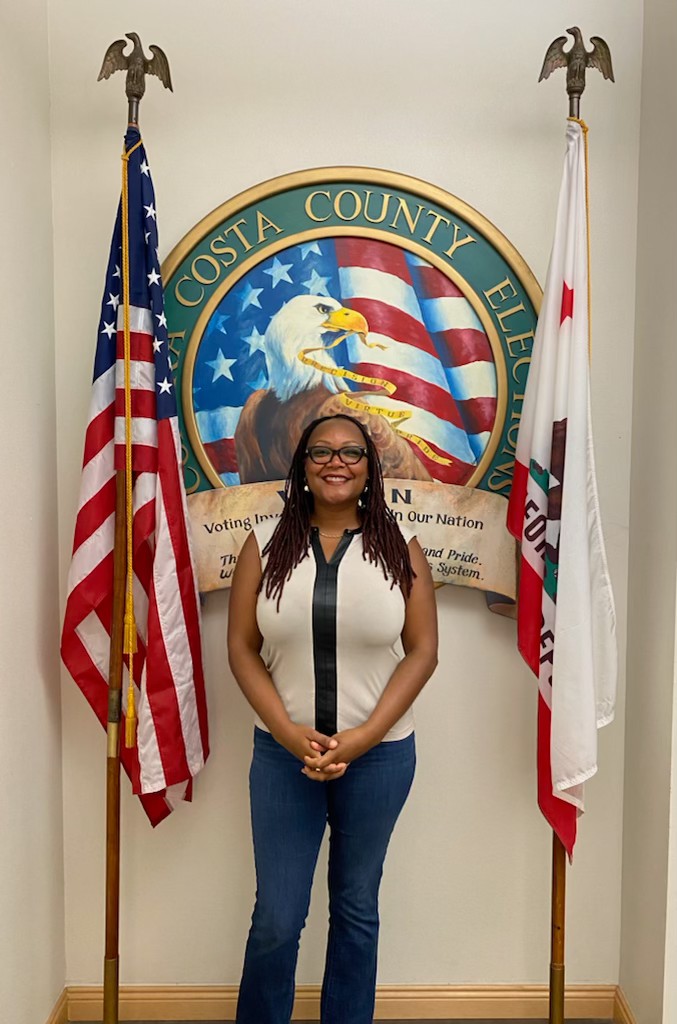
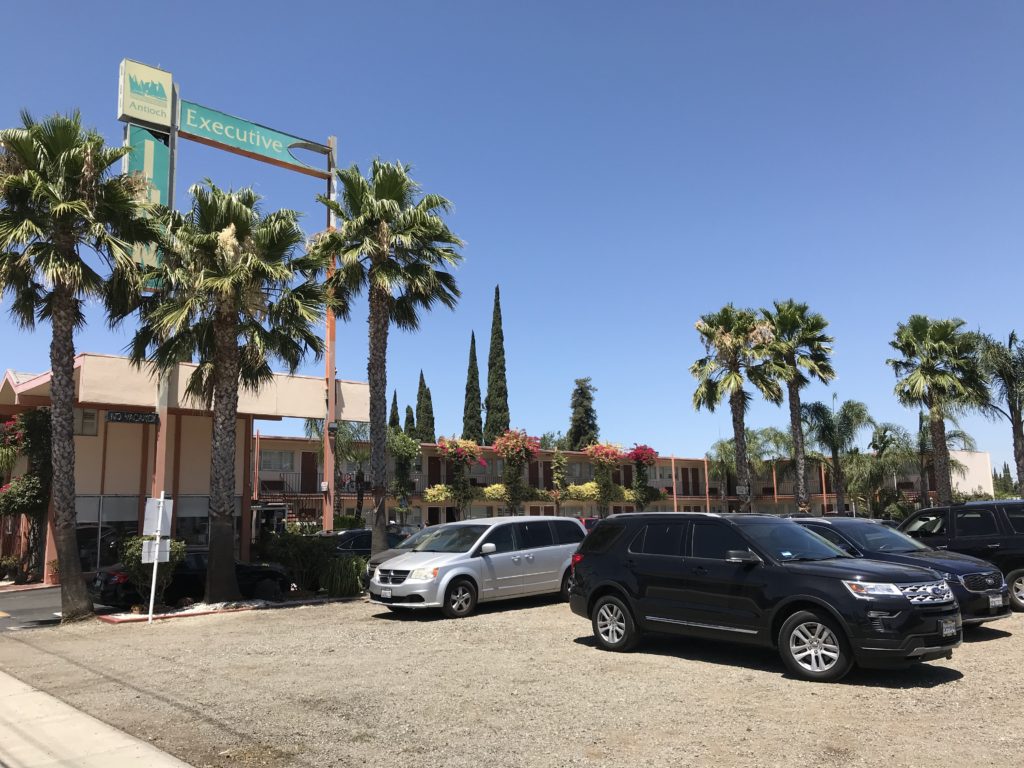


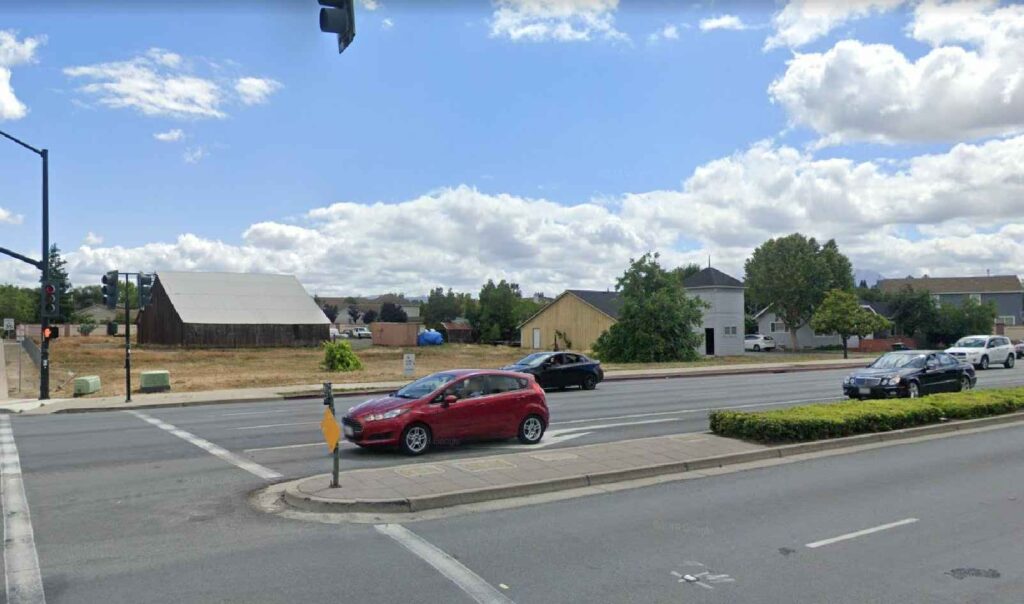

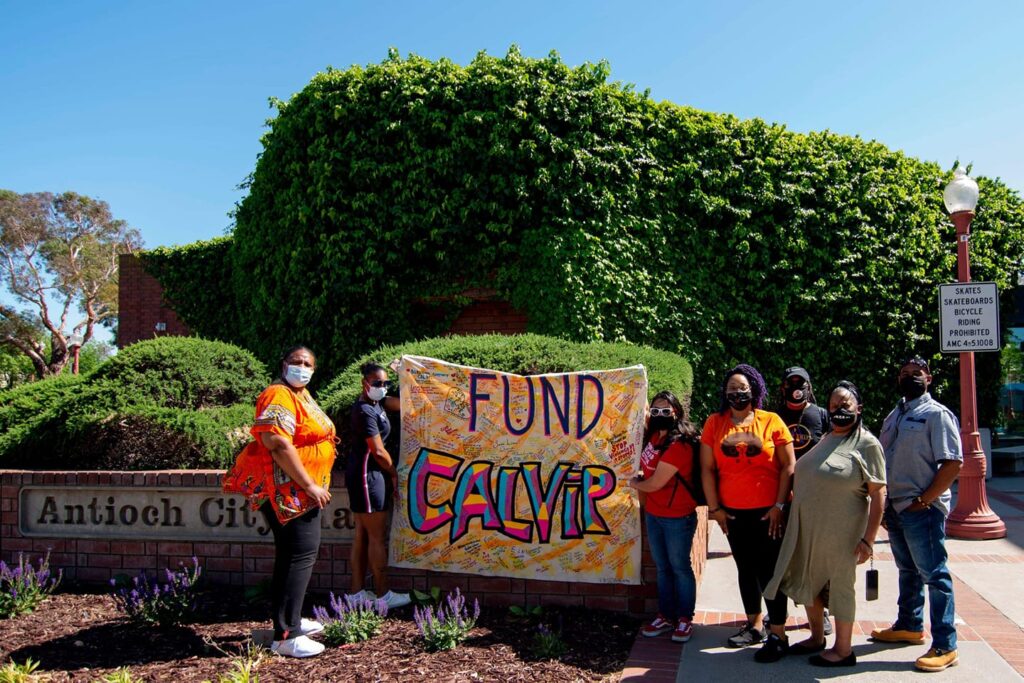
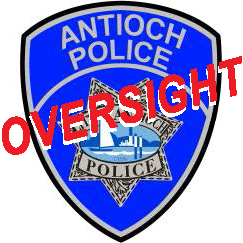 By Allen D. Payton
By Allen D. Payton By Allen D. Payton
By Allen D. Payton













